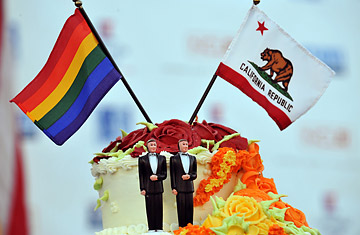
The California Supreme Court's 4-3 decision overturning a state ban on same-sex marriage has cheered backers of marriage equality, and particularly California couples whose path to the altar has been cleared. Presumptive Democratic nominee Barack Obama, however, may not share their joy. Though he surely counts on the Golden State's 55 electoral votes bolstering his electoral total in November, some political analysts now say this wedge issue may drive California's social conservatives to the polls and put the state in play for de-facto Republican nominee John McCain. "Two days ago, you'd put his chances, at best, at 20-30%," says California GOP pollster Stephen Kinney. "Right now, I think you could put it at 50-50. This ruling changes the dynamics. It will energize our voting base."
Kinney concedes that California — the nation's heftiest electoral prize — is still widely considered "a longshot" for Republicans. But the state will be a sticky predicament for Obama, who does not back gay marriage itself, only "civil unions." Conservative voters may not make the same distinction. Kinney notes that Proposition 22, the anti-gay marriage initiative vacated by the Court's ruling, was supported by 61% of Californians in 2000.
Not everyone thinks the ruling could prompt a major electoral shift. "It's obviously going to be polarizing," says pollster John Zogby. "But will it be an election changer? Probably not. Take your navy blue crayon and color California in on the election map." Gavin Newsom, the San Francisco mayor who received death threats when he ordered marriage licenses for same-sex couples in 2004, told TIME that "Republicans need a bigger issue this year. Gay marriage is not going to work."
But even if California remains secure for the Democrats, the Court's ruling could still factor heavily into the electoral math in November. McCain "has to look for issues that motivate and activate social conservatives," says Bill Whalen, a research fellow at the Stanford University-based Hoover Institution. "This issue is a gift in that regard. It gives him a very effective talking point in Ohio, in Michigan, in Wisconsin, where he's appealing to culturally conservative Catholics and swing voters."
Yet the Court's decision also thrusts McCain into a tightrope act: on this high-voltage issue, he must simultaneously court centrist voters and cater to the party's base. In California, strong denunciations of "activist judges" are unlikely to sway voters, says University of California-Berkeley political scientist Bruce Cain, who adds that if McCain is to capitalize on his slim chances in California, it won't be by "championing a social conservative cause. There just ain't enough of them." Nor, Cain says, is gay marriage an issue capable of inflaming an electorate consumed with a sagging economy and a moribund housing market. "California is slightly red with respect to economic policy, and slightly blue with regard to social policy," Cain says.
But California Republicans are hoping that history will prove instructive. After Massachusetts became the first state to codify marriage equality in 2003, the G.O.P. spent the ensuing general election wielding the issue as a potent weapon. Thirteen states passed ballot initiatives to ban same-sex marriage — including Ohio, the battleground that tipped the 2004 election in George W. Bush's favor. Opponents of gay marriage in California have generated more than 1 million signatures to place on November ballots an initiative amending the state's constitution to prohibit same-sex marriage. Newsom expects the measure will appear on the ballot. Voters in Florida, 2000's election fulcrum, will face a similar choice. While Cain says "this is an issue that will have appeal," he notes that "there's a huge dispute over whether these measures made any difference last time."
The muddied electoral math wasn't on the minds of same-sex couples and supporters in the aftermath of the court's decision. "We're exhilarated and proud," says Newsom, who spoke of a poignant moment in which a teary-eyed son thanked the mayor for supporting his mother's relationship. For same-sex couples, their families and supporters, the Court's ruling was a sunlit moment. But the political forecast has become a bit cloudier.
